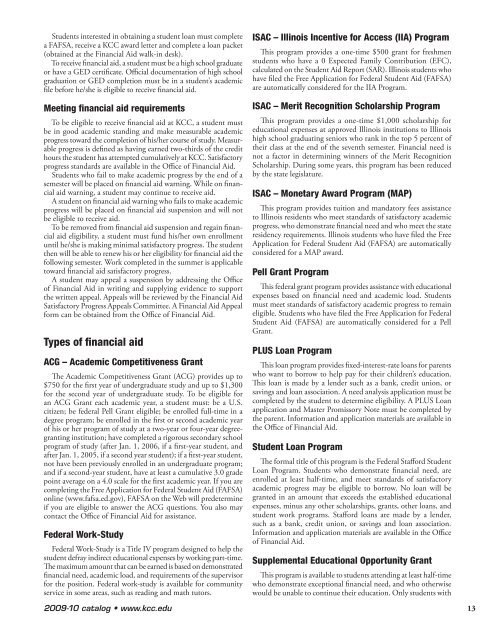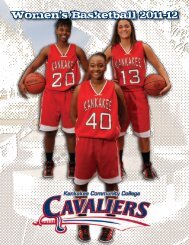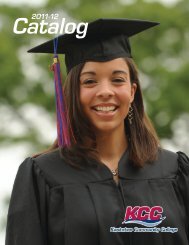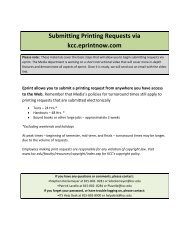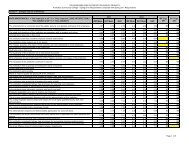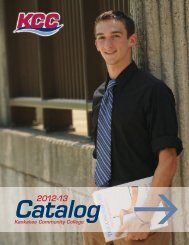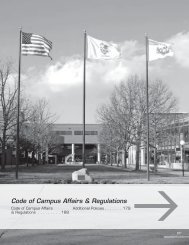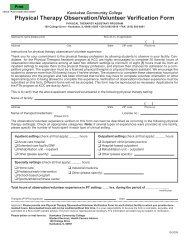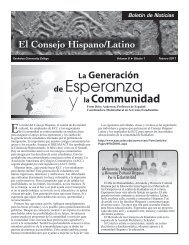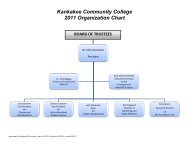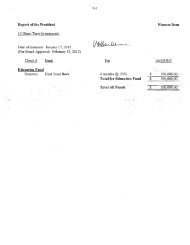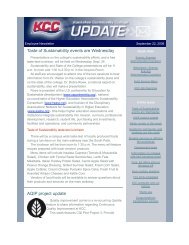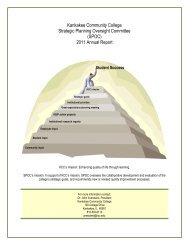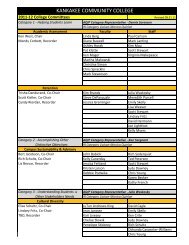09-10_Academiccatalog(Fullcatalog4.30mb) - Kankakee ...
09-10_Academiccatalog(Fullcatalog4.30mb) - Kankakee ...
09-10_Academiccatalog(Fullcatalog4.30mb) - Kankakee ...
You also want an ePaper? Increase the reach of your titles
YUMPU automatically turns print PDFs into web optimized ePapers that Google loves.
Students interested in obtaining a student loan must complete<br />
a FAFSA, receive a KCC award letter and complete a loan packet<br />
(obtained at the Financial Aid walk-in desk).<br />
To receive financial aid, a student must be a high school graduate<br />
or have a GED certificate. Official documentation of high school<br />
graduation or GED completion must be in a student’s academic<br />
file before he/she is eligible to receive financial aid.<br />
Meeting financial aid requirements<br />
To be eligible to receive financial aid at KCC, a student must<br />
be in good academic standing and make measurable academic<br />
progress toward the completion of his/her course of study. Measurable<br />
progress is defined as having earned two-thirds of the credit<br />
hours the student has attempted cumulatively at KCC. Satisfactory<br />
progress standards are available in the Office of Financial Aid.<br />
Students who fail to make academic progress by the end of a<br />
semester will be placed on financial aid warning. While on financial<br />
aid warning, a student may continue to receive aid.<br />
A student on financial aid warning who fails to make academic<br />
progress will be placed on financial aid suspension and will not<br />
be eligible to receive aid.<br />
To be removed from financial aid suspension and regain financial<br />
aid eligibility, a student must fund his/her own enrollment<br />
until he/she is making minimal satisfactory progress. The student<br />
then will be able to renew his or her eligibility for financial aid the<br />
following semester. Work completed in the summer is applicable<br />
toward financial aid satisfactory progress.<br />
A student may appeal a suspension by addressing the Office<br />
of Financial Aid in writing and supplying evidence to support<br />
the written appeal. Appeals will be reviewed by the Financial Aid<br />
Satisfactory Progress Appeals Committee. A Financial Aid Appeal<br />
form can be obtained from the Office of Financial Aid.<br />
Types of financial aid<br />
ACG – Academic Competitiveness Grant<br />
The Academic Competitiveness Grant (ACG) provides up to<br />
$750 for the first year of undergraduate study and up to $1,300<br />
for the second year of undergraduate study. To be eligible for<br />
an ACG Grant each academic year, a student must: be a U.S.<br />
citizen; be federal Pell Grant eligible; be enrolled full-time in a<br />
degree program; be enrolled in the first or second academic year<br />
of his or her program of study at a two-year or four-year degreegranting<br />
institution; have completed a rigorous secondary school<br />
program of study (after Jan. 1, 2006, if a first-year student, and<br />
after Jan. 1, 2005, if a second year student); if a first-year student,<br />
not have been previously enrolled in an undergraduate program;<br />
and if a second-year student, have at least a cumulative 3.0 grade<br />
point average on a 4.0 scale for the first academic year. If you are<br />
completing the Free Application for Federal Student Aid (FAFSA)<br />
online (www.fafsa.ed.gov), FAFSA on the Web will predetermine<br />
if you are eligible to answer the ACG questions. You also may<br />
contact the Office of Financial Aid for assistance.<br />
Federal Work-Study<br />
Federal Work-Study is a Title IV program designed to help the<br />
student defray indirect educational expenses by working part-time.<br />
The maximum amount that can be earned is based on demonstrated<br />
financial need, academic load, and requirements of the supervisor<br />
for the position. Federal work-study is available for community<br />
service in some areas, such as reading and math tutors.<br />
ISAC – Illinois Incentive for Access (IIA) Program<br />
This program provides a one-time $500 grant for freshmen<br />
students who have a 0 Expected Family Contribution (EFC),<br />
calculated on the Student Aid Report (SAR). Illinois students who<br />
have filed the Free Application for Federal Student Aid (FAFSA)<br />
are automatically considered for the IIA Program.<br />
ISAC – Merit Recognition Scholarship Program<br />
This program provides a one-time $1,000 scholarship for<br />
educational expenses at approved Illinois institutions to Illinois<br />
high school graduating seniors who rank in the top 5 percent of<br />
their class at the end of the seventh semester. Financial need is<br />
not a factor in determining winners of the Merit Recognition<br />
Scholarship. During some years, this program has been reduced<br />
by the state legislature.<br />
ISAC – Monetary Award Program (MAP)<br />
This program provides tuition and mandatory fees assistance<br />
to Illinois residents who meet standards of satisfactory academic<br />
progress, who demonstrate financial need and who meet the state<br />
residency requirements. Illinois students who have filed the Free<br />
Application for Federal Student Aid (FAFSA) are automatically<br />
considered for a MAP award.<br />
Pell Grant Program<br />
This federal grant program provides assistance with educational<br />
expenses based on financial need and academic load. Students<br />
must meet standards of satisfactory academic progress to remain<br />
eligible. Students who have filed the Free Application for Federal<br />
Student Aid (FAFSA) are automatically considered for a Pell<br />
Grant.<br />
PLUS Loan Program<br />
This loan program provides fixed-interest-rate loans for parents<br />
who want to borrow to help pay for their children’s education.<br />
This loan is made by a lender such as a bank, credit union, or<br />
savings and loan association. A need analysis application must be<br />
completed by the student to determine eligibility. A PLUS Loan<br />
application and Master Promissory Note must be completed by<br />
the parent. Information and application materials are available in<br />
the Office of Financial Aid.<br />
Student Loan Program<br />
The formal title of this program is the Federal Stafford Student<br />
Loan Program. Students who demonstrate financial need, are<br />
enrolled at least half-time, and meet standards of satisfactory<br />
academic progress may be eligible to borrow. No loan will be<br />
granted in an amount that exceeds the established educational<br />
expenses, minus any other scholarships, grants, other loans, and<br />
student work programs. Stafford loans are made by a lender,<br />
such as a bank, credit union, or savings and loan association.<br />
Information and application materials are available in the Office<br />
of Financial Aid.<br />
Supplemental Educational Opportunity Grant<br />
This program is available to students attending at least half-time<br />
who demonstrate exceptional financial need, and who otherwise<br />
would be unable to continue their education. Only students with<br />
20<strong>09</strong>-<strong>10</strong> catalog • www.kcc.edu<br />
13


